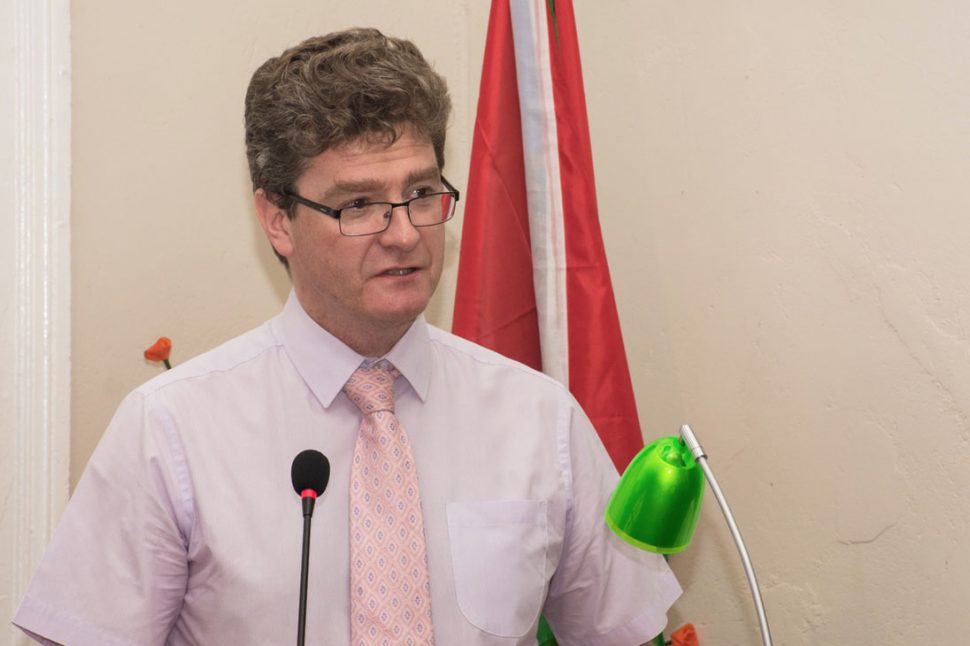Guyana is better off with more operators and countries involved in its oil fields, British High Commissioner to Guyana Gregory Quinn has said in wake of UK-based Tullow Oil’s recent offshore oil discovery.
Tullow last week announced the discovery of oil in commercial quantities in its Orinduik Block, offshore Guyana, which represents the first commercial find outside of the Stabroek Block, where ExxonMobil has made 13 major finds since May 2015. Its first exploration well, Jethro-1, is estimated to hold more than 100 million recoverable barrels of oil.
Speaking with reporters after a press conference about a city chamber trade mission to Aberdeen, Quinn yesterday said that from his perspective, the Tullow find is good for Guyana for two reasons—it demonstrates that there is oil outside of the Stabroek Block, which shows that Guyana’s potential is far bigger than that block; and it brings in a whole new set of companies, countries and operators. “…And the more operators and countries and companies you have involved in the oilfields, the better,” Quinn said.
The find has also been attended by sharper scrutiny of the Production Sharing Agreement (PSA) signed between government and Tullow and Eco (Atlantic) in 2016. Under the agreement, Guyana will receive a 1 per cent royalty while profits will be shared on a sliding scale. Article 11 of the 69-page agreement, which addresses cost recovery and production sharing, says that the government will receive 50 per cent of profits earned from the first 25,000 barrels of oil per day, 52.5 per cent from the next 25,000 barrels, 55 per cent from the next 15,000 barrels, 57.5 per cent from the next 15,000 barrels and 60 per cent for production above 80,000 barrels.
Quinn refused to comment on the contract and said that is for Tullow and the government to discuss but he stressed that the find by Tullow is, fundamentally, good for Guyana.
Meanwhile, also speaking in wake of the find, President of the Georgetown Chamber of Commerce and Industry Nicholas Deygoo-Boyer emphasised the need to set up regulatory bodies for the oil industry.
Minister of Finance Winston Jordan last week noted that letters were sent to the varying stakeholders to submit their nominees for the Public Accountability and Oversight Committee that is to ensure the transparent spending of the funds
He said no responses were received, including from the Private Sector Commission.
However, Deygoo-Boyer explained that a response was delayed during a changeover of the executive body and the private sector would be responding to Jordan.
Deygoo-Boyer also stressed that there is a need to set up the Petroleum Commission and other mechanisms to insulate the industry from too much political control.
“If you notice with the Exxon contract and the Tullow contract you have varying terms, so we need to move management of our oil industry from direct control by political actors, insulate it and make it transparent. And when it’s transparent I think you’ll see more of a harmonisation,” he said.
He added that when the Petroleum Commission is activated, the needed expertise can always be contracted on an as-needed basis.
“So you have lawyers and investment bankers and energy consultants who can give you reviews, who can do studies across the world to see what terms are in other PSAs across the world and highlight the risks and rewards to us for putting certain terms in and taking certain terms out and where we fall within a world of comparisons and then transparency would allow everybody to make their own judgment,” Boyer explained.
Tullow operates the Orinduik block with a 60 per cent stake, while France’s Total SA and Toronto-listed Eco Atlantic Oil & Gas Ltd each own 15 per cent, with state-owned Qatar Petroleum holding the remaining 10 per cent.
Eco had sold 25 per cent of its initial 40 per cent stake to Total last year and Reuters reported that the French oil giant in turn sold 40 per cent of its stake to Qatar Petroleum last month.

